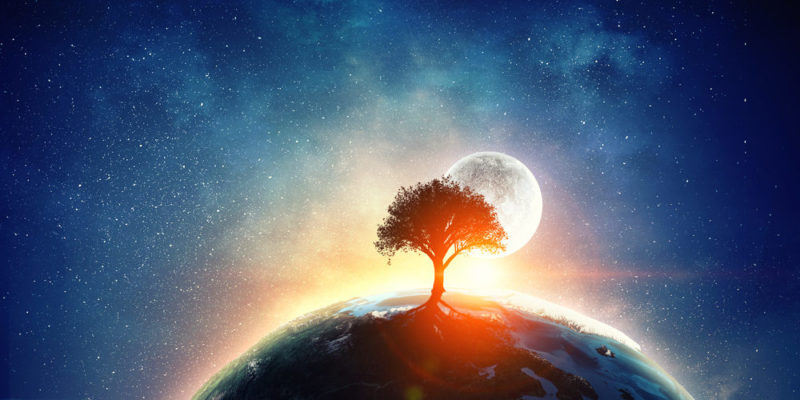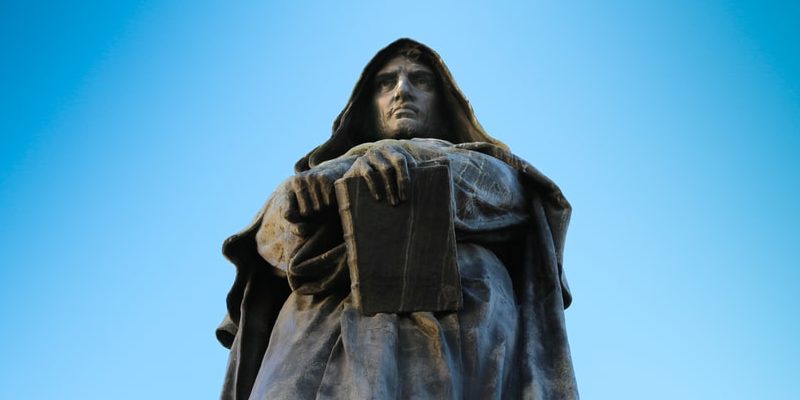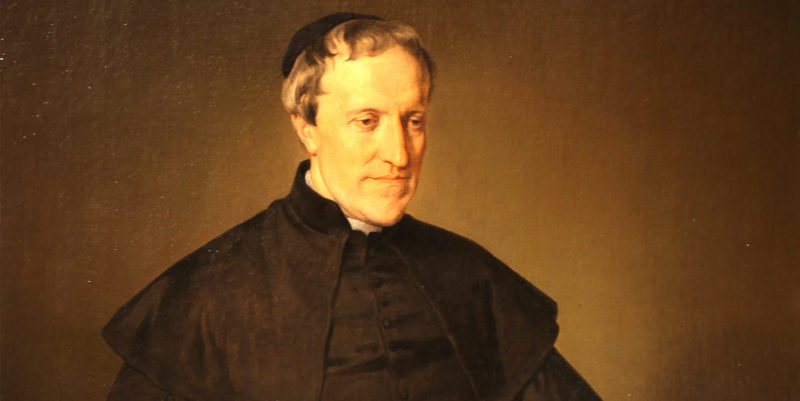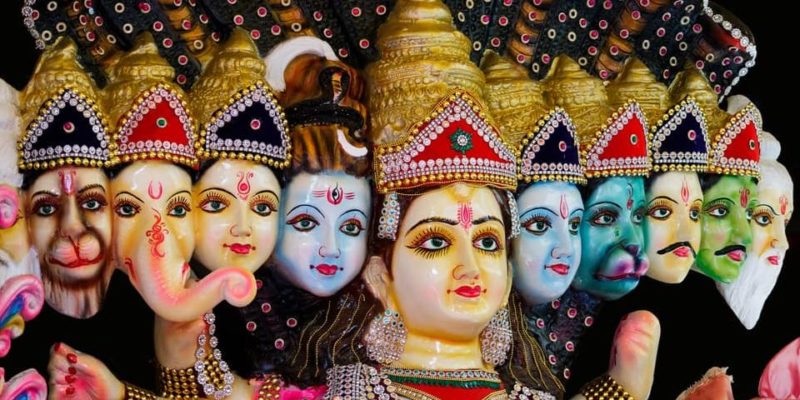We explain what pantheism is, what it consists of and how it is classified. Also, what are its characteristics and why is it important.

What is pantheism?
Pantheism is a philosophical current that maintains that the concept of “God” is equivalent to saying universe, existence or god himselfas understood by monotheistic religions. “God” is nothing more than a way of calling natural law, existence itself.
Pantheists think that the creator (God) and the creature (the world and everything that is created by divine work) are one thing. This type of thinking is known as monismand is distinguished from theism usual of most religions, in which “god” and “world” are conceptually opposed. Beyond the possible differences between the different historical pantheisms, what they all have in common is the conception of reality as something immanent (closed in itself), which is the only thing that exists.
See also: Nihilism
Etymology of the term “pantheism”
The word “pantheism” It comes from the union of two Greek words: the neutral adjective bread (πᾶν), which means “everything,” and the noun théos (θεός), which translates as “god.” Hence “pantheism” can be translated as “God in everything.”
Origin of pantheism

The term “pantheism” It appeared for the first time in Latin, in the work From Spatio Reali its Infinite Entity by the English mathematician Joseph Ralsonpublished in 1697. The origin of pantheism as a model of thought is unknown. However, we find marked features of this system in philosophers even before Ralson, such as John Scotus Erigena (815-877 AD) or Nicholas of Cusa (1401-1464). Part of its principles can also be found in the work of Giordano Bruno (1548-1600). These previous studies allowed pantheism to be born in the 16th century as its own system and serve as a prelude to materialism and atheism.
What is pantheism?
The fundamental proposition of pantheism is that God and nature are one and the same thing. This is not a form of polytheism, in which each aspect of nature is assigned a deity, but, on the contrary, everything that exists forms a unit that can be called God. This includes objects, natural laws, astronomical bodies and the human being himself.
pantheism does not propose a God as a specific knowable entityreachable by some kind of method. Reality, in its entirety, is a divine manifestation, an emanation of God, which must be understood as the principle of what is, but also as that which keeps it being.
Main thinkers of pantheism

- Giordano Bruno. This Italian astronomer, philosopher, theologian and poet stated in his work various ideas regarding natural reality, which are especially collected in his book Of the cause, the beginning and the one (1584). The pantheism of Giordano Bruno is an atheistic pantheism, and expresses an idea of the universe as the “soul of the world”, a universal intellect that fills and reaches everything. His ideas were revolutionary with respect to those accepted and defended by the Catholic Church, so much so that his work was banned by the Holy Inquisition and he himself was tried as a heretic and burned at the stake.
- Baruch Spinoza. One of the fundamental thinkers of 17th century rationalism along with Leibniz and Descartes, this Dutch Jewish philosopher was the author of one of the greatest rationalist questions to the religious orthodoxy of the time. His statement that “Everything that is, is in God, and without God nothing can be or be conceived” (etici, XV), radicalizes the monism of substance and the finitude of modal individuals, making God explicit in his creation. His approach to pantheism can be considered panentheism (a current that proposes a god who encompasses the universe but is not limited to it), and has been criticized by later philosophers such as Friedrich von Schelling.
- Scotus Eriugena. Irish philosopher of the Carolingian Renaissance, he lived, thought and wrote in the 9th century (810-877 BC). Even though the academic community does not pronounce itself regarding Eriugena's pantheism, its affirmation regarding the unity and identity of God with the creature, “Deus est omnia” (God is all things), undoubtedly places him on this list.
- Antonio Rosmini. This 19th century Italian thinker and philosopher, founder of the clerical order Institute of charitywas the author of a work that attempted to contrast the Enlightenment and Sensism, attacking both empiricism and scholasticism. His work was condemned by the Holy Catholic See, but he was finally beatified in 2007.
- Pierre Teilhard de Chardin. A Jesuit religious devoted to philosophy and paleontology, he contributed a very personal version of evolution, which distanced himself from the struggle between science and religion of the late 19th and early 20th centuries. This caused him to be attacked by the church and ignored by science.
Types of pantheism
Two variants of pantheism are often identified:
- Religious or acosmist pantheism. It is called that because it is based on the existence of a divine reality that is the only true one, and to which the world is reduced. According to this current, the world is a manifestation or emanation of God.
- Atheistic or naturalistic pantheism. It understands nature as the only true reality, to which God is reduced, who becomes an organic principle of nature itself, a self-consciousness of the universe. According to this current, the God of monotheistic religions, thought of as a separate entity, does not exist.
Religion and pantheism

Most monotheistic religions, whose body of beliefs defend the worship of a single true god, reject any pantheistic position. They consider it pagan or close to idolatry.that is, to replace the cult of the true god with the cult of objects.
In other cases, such as Hindu polytheism, The approaches about the relationship between the world and the gods that govern it can become similar to pantheism. These religions have an almost infinite pantheon of gods, which identifies not only external aspects of the human being, but also internal ones.
However, it is important to note that even in these cases the gods have their own entity. That is, they are still separated from the real world.
Panentheism and pandeism

Pantheism should not be confused with the following concepts:
- panentheism. The difference between one and the other is that panentheism proposes a god who encompasses the universe but is not limited to it. This means that he is the creator of the universe, its vital energy, source of all natural law. This idea of God is the idea of a transcendent god, different from the immanent conception of the divine proposed by pantheism.
- Pandeism. It is a philosophical model that results from the union of pantheism and deism. He maintains that the creator of the universe merged with his creation and ceased to exist as a separate entity. Pandeism attempts to answer why God would create the universe and then abandon it.
Why is pantheism important?
Pantheism as a philosophical doctrine played an important role in the formation of Western culture. He participated in the difficult transition between the religious mentality that prevailed during much of the Christian Middle Ages, and the modern, rationalist and scientific mentality, which prevailed from the 17th century onwards.
As a prelude to the possibility of atheism and agnosticism, pantheism was important because, By unifying God with nature, the need for structured worship was reduced. A religious temple could be dispensed with since, in pantheism, God does not have a specific entity, recognizable through any religious practice.
Current resignation
In contemporary times, pantheism has suffered a resignification at the hands of more idealistic and reactionary religious and philosophical currents. They try to use it to reconcile scientific discourse with religionsince God encompasses everything, including any scientific discovery.
We can also find great examples of pantheistic systems in literature, television or cinema. Ideas like that of forcein Star Wars, or the world designed by James Cameron in Avatarare pantheistic conceptions of the universe, where divinity is presented immanently in creation.
Continue with: Creationism
References
- Arana, J. (2001). Pantheism and its forms. Philosophy Magazine, 575-18.
- Harrison, P. (2001). A Pantheist Vision of God: The Divine Universe. Expanding Humanities Vision Of God251.
- Levine, M. P. (2002). Pantheism: A non-theistic concept of deity. Routledge.
- “Pantheism” in the Soviet Dictionary of Philosophy.
- “Pantheism” in The Encyclopaedia Britannica.





